---------------------------------------------------------
Ducks make an excellent addition to any homestead. They are reliable layers of extra large eggs and are excellent foragers to help keep your yard pest free. Plus they have such fun personalities! It is impossible not to smile while watching your ducks splash about in a puddle or small pool.
Ducks are hardy birds that can happily live in a range of climates. Properly cared for, they rarely have parasites or health issues. But many people get their first ducklings at the feed store and are told by well meaning store employees that they are “just like caring for chickens”. While ducks can easily live with their poultry cousins (click here to read about raising a mixed flock of chickens & ducks), there are some very important differences in their care.
#1 – Ducklings Need Niacin
If you only remember one tip, this is the one. I can’t even count the amount of emails and messages I have received from readers with a duckling that has developed lameness in the legs. Many feed stores sell chicks and ducklings in the spring time. I have heard from so many people that the employees told them it was fine to feed both standard chick starter as complete nutrition.
If you think about what chicken & duck mothers would feed their young you can see the difference. Both would get bugs and greens, but the ducklings would also eat small fish, snails, and weedy greens. So the protein and grain needs are nutritionally met with chick starter feed, but fish and crustaceans are naturally high in niacin (also known as vitamin B3). Growing ducklings need 2-3 times the amount of niacin as growing chicks.
So while it IS ok to feed ducklings chick starter feed, you need to provide an additional vitamin B3 supplement. Brewer’s yeast powder is an easy to add supplement. This can be found at most health stores, in the supplement section of some grocery stores, or online. To supplement your ducklings, add 1.5 tablespoons brewer’s yeast per cup of feed. If you notice one duckling in particular struggling, you can give her liquid niacin directly in her bill. It is harder to find than chick starter, but if you can find waterfowl starter feed you can avoid having to add niacin.
If the duckling doesn’t get enough niacin, you will first notice slight lameness which will continue to get worse until the duckling doesn’t want to walk at all. If not corrected immediately the duckling could die, or could suffer lasting lameness for it’s entire life. Click here to read more about Ducklings & Niacin
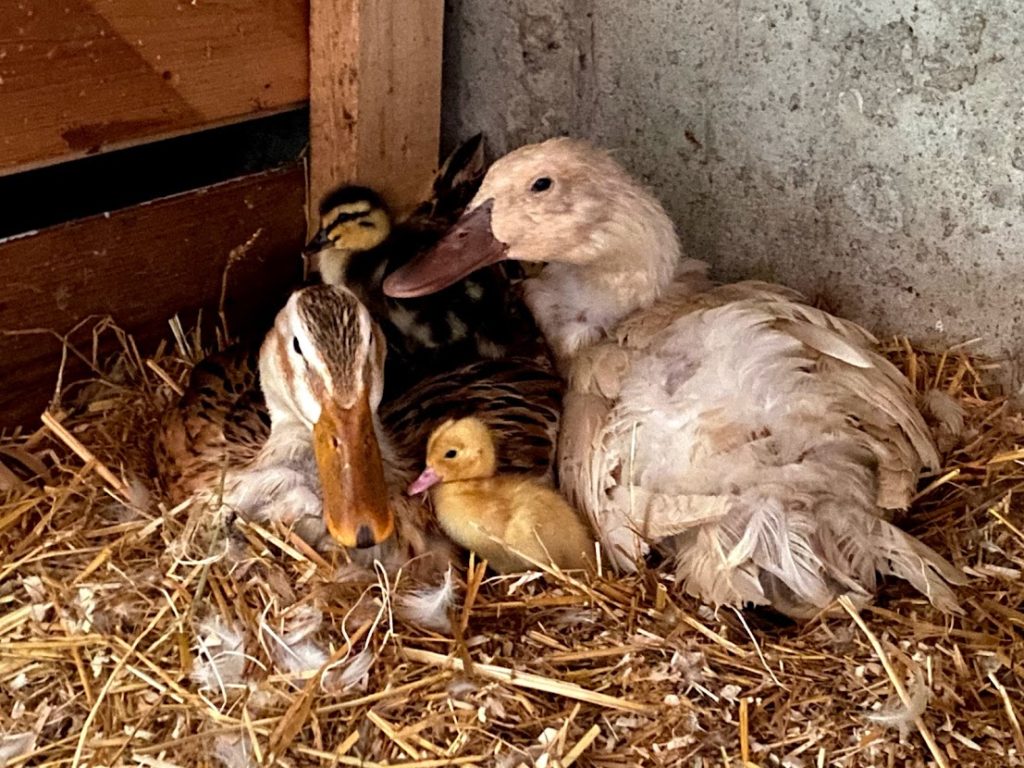
#2 – Correctly Balance Your Flock
Ducks are very social animals, you should never keep a single duck all by itself. But it is important that you balance the genders within your flock. Ducks are very rambunctious maters. If there are too many males and not enough females, your female ducks will experience injuries ranging from missing feathers along their head/neck (enough to cause large bleeding wounds), to leg and back injuries. Keeping a single female with several males will likely result in the female being killed.
At the very least you should have 3 females for every 1 male – but 4 or 5 females per male is even better. This allows the male to spread his affections. Many new duck keepers think that ducks “mate for life” like geese or swans so they buy their ducks in male/female pairs. In the wild, ducks do not mate for life, rather they form seasonal bonds where a male will defend his mate from other suitors but will not necessarily be monogamous. Once the female lays her eggs, the male usually leaves. In your backyard flock however, the females can’t just fly off and are stuck year round with the males. click here to read more about keeping drakes in your flock
If you are only planning on keeping ducks for pets or for eggs, I would recommend you keep an all female flock. Most hatcheries will allow you to choose the gender for an additional fee. This is well worth it! It can be very hard to re-home extra drakes, so unless you are looking to raise ducks for meat you will want to pay for pre-sexed ducklings.
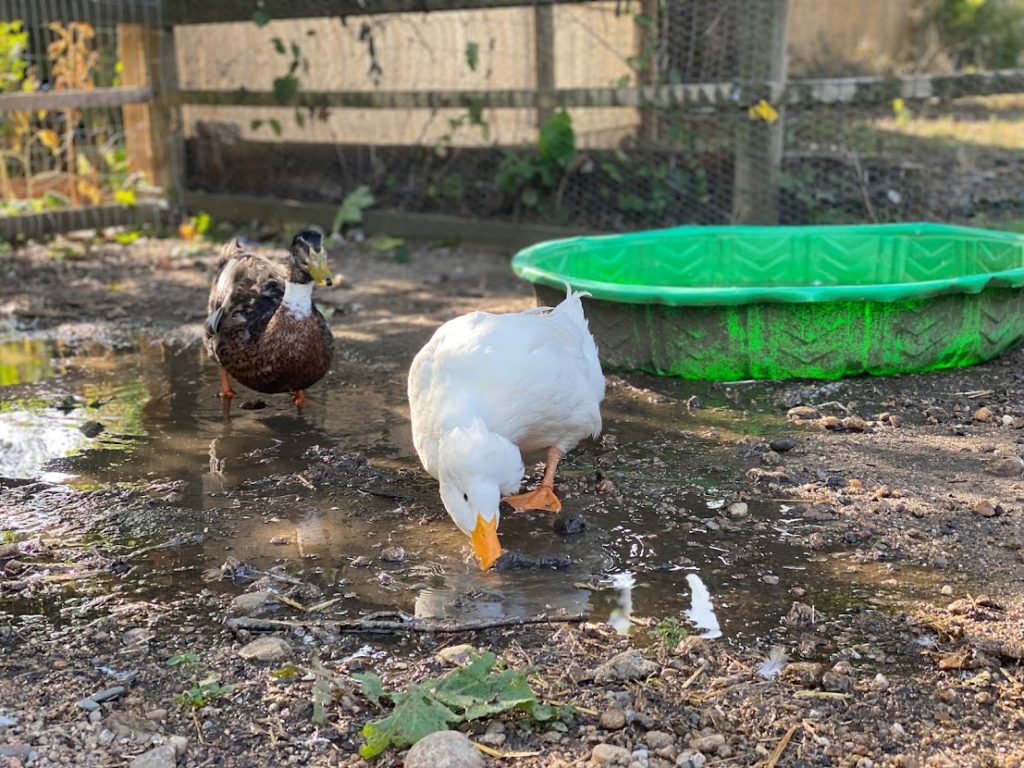
#3 – Provide ground level nesting boxes
Domestic ducks have been bred for generations so that they can not fly. This is a good thing for the backyard duck keeper because it means that they won’t fly away! Generally, they can not make it more than a couple of feet off the ground, and even then they often need a running start.
You will want to provide nesting boxes at ground level for the ducks to lay their eggs in. BUT be forewarned – ducks are not the best at using nesting boxes. They tend to just lay eggs where ever they feel like it. Sometimes it’s just right in the middle of the coop or yard! By providing easy access to a tempting, warm, dry nesting area you are more likely to avoid the daily egg hunt. click here to read about the dual chicken & duck nesting boxes I made
Ducks also don’t roost when they sleep the way chickens do. They will sleep right on the floor, usually in a corner of the coop. Give them some straw and they will usually make a nice cozy sleeping area all on their own. Their egg laying & sleeping habits make it easy to build a shelter for them. They don’t need anything fancy, just a secure enclosure to keep them safe from predators.
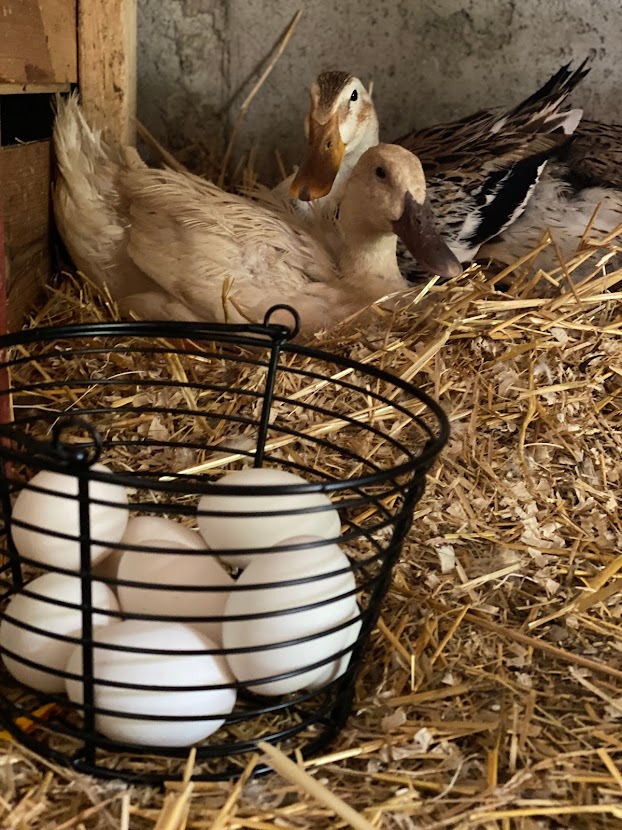
#4 – Ducks need open water
Go to a feed store and look for a “poultry” waterer and you will often find a bucket with a small tray around the bottom for the bird to drink from. These types of waterers are great for chickens, but not for ducks. As waterfowl, ducks need to keep their sinuses and mucous membranes moist. You will need to provide access to drinking water deep enough for the duck to totally submerge their head in. The drinking tray in most “poultry waterers” is not sufficient for this.
Most duck owners use an open bowl, dish, or bucket for drinking water. The problem with this is ducks can’t resist open water – they will jump right in for a swim. If they fits, they sits! So be prepared to change the drinking water daily to keep it clean.
As far as swimming water, it is not strictly necessary to provide your ducks with a pond or pool. They will LOVE it if you do but can live without it. I like to use a small kiddie pool from spring – fall. It’s easy enough to dump and clean often but big enough that they can splash and swim a bit.
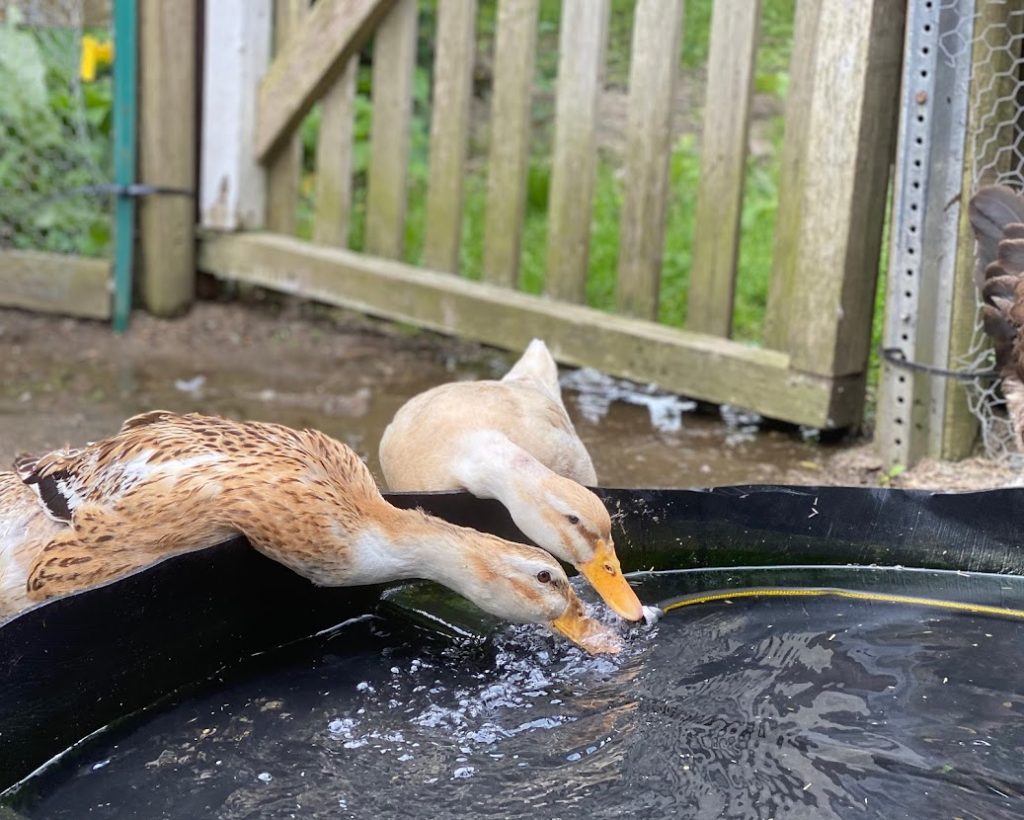
#5 – Prepare for a mess
There are no two ways around it – ducks are messy. If you can learn to handle the mess they make though, you will be so rewarded! Not only do their eggs taste delicious and make all your baked goods fluffy and light, but they have such fun personalities! Friendly and curious, I think ducks are more interactive with their human caretakers than chickens. And show them a kiddie pool and they can’t contain their excitement with wagging tails, splashing feet, and happy quacks – and you won’t be able to contain your smile!
Ways to deal with the mess
Drainage is vitally important in your duck area. If you have a pool for them, provide drainage underneath & around it. A great swimming set up would be to build a “pad” that is 2 feet larger in circumference than your pool. Use pressure treated wood or large stones to contain layers of sand & gravel and place the pool in the center (just make sure the ducks can navigate around the border).
If you have a duck yard, sand is the best ground covering. It will wash away eventually, so you will have to replace it annually, but having a good layer of sand will go a long way in keeping a dry duck yard. The drier you can keep the area, the less it will smell. Sweet PDZ is often used in horse stalls as a way to neutralize odors and moisture and it will also work well in your duck area.
If you have a small coop, keep the feed & water outside. The ducks are going to splash and make a mess with their drinking water. They need to have water with their food to avoid choking, so they will often go back and forth between the feed & water buckets, making a mess in between. If you have a small coop, it’s best to keep this mess outside of the coop. They will be alright overnight without food & water. To prevent rodents from snacking on the food overnight, put the feed away in a metal bin. If you have a larger coop and keep the feed & water inside, provide good drainage under the feed area. The ideal flooring in a coop is sand with straw on top for nesting.
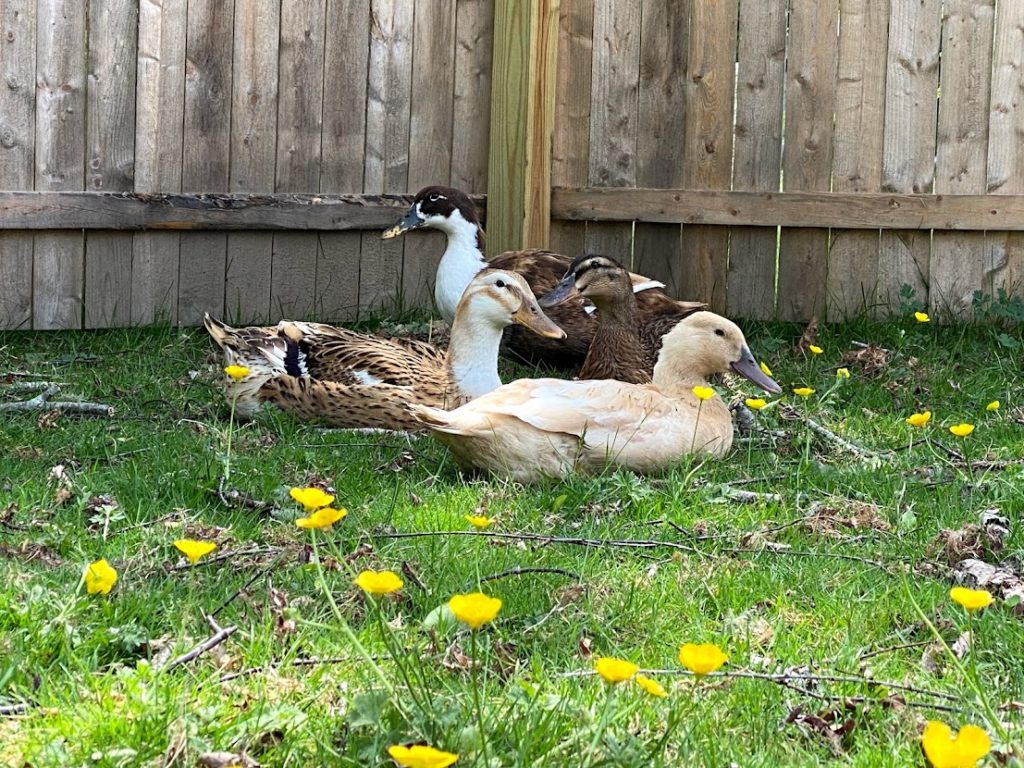

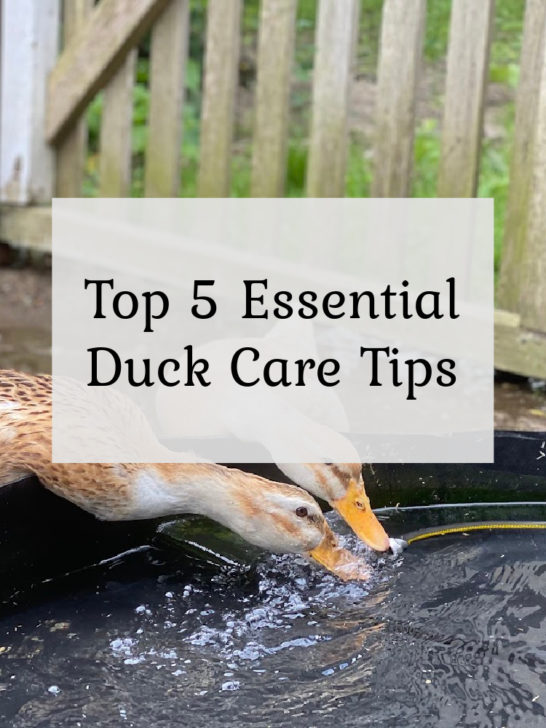

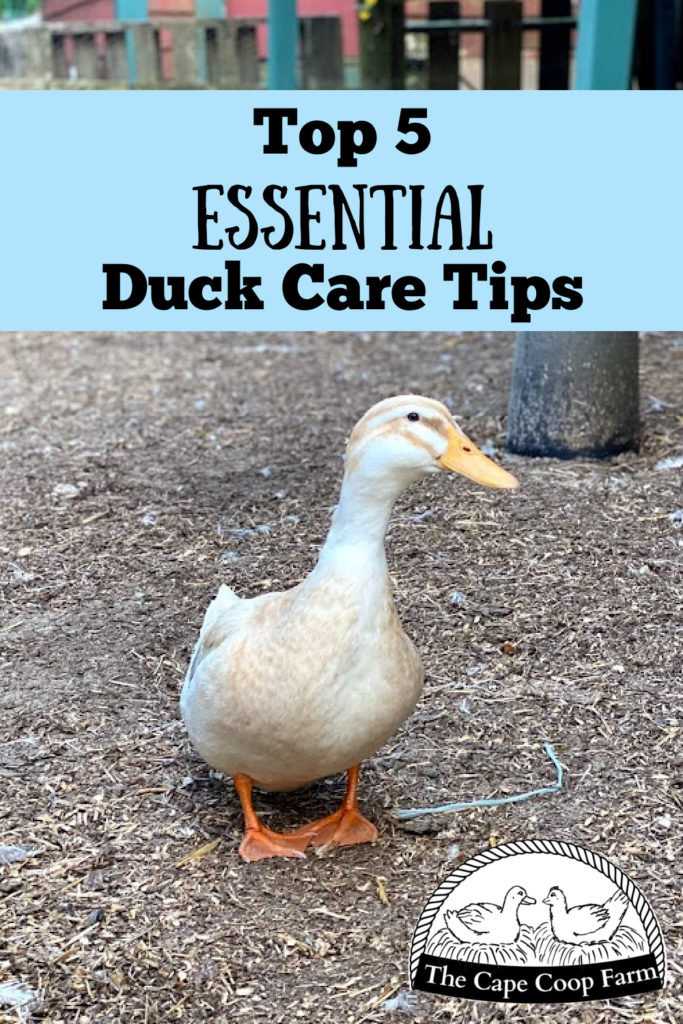
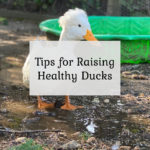
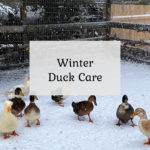

Jeannette Martin
Wednesday 8th of June 2022
Hi Liz, I have a duck that lives with a few chickens in harmony. A couple of days ago one of her eyes started looking funny- a little swollen, like maybe conjunctivitis or something? For the life of me I cannot find a vet around who deals with game or poultry. I’m wondering if you or anyone knows about some ointment or home remedy situation that I can use to help her? It’s looking a little better already but just in case…
Gary
Wednesday 13th of April 2022
Hello, I currently have 5 ducks. 4 Khaki Campbells(2 males, 2 females) and a Rouen female possibly mixed. The Rouen female is the oldest. When I enter their yard to get put them in their house in the late afternoon/evening. Frequently some of them will quack and bob their head off to the side with the bill pointed at the ground. Usually its the older Rouen and rarely the drakes. I rarely see it any other time. Any idea what behavior this is?
Liz
Monday 18th of April 2022
bobbing their head up and down while quacking is often a sign of happiness or flirting, but bobbing to the side while quacking is usually a defensive motion. They are saying they don't want you in their space - it happens most often in the spring during mating season. The females will try to keep "competitors" from their mate and will also be defending their nesting space. Hopefully once their spring hormones settle a bit this will get better. But in the meantime you can try offering them a handful of treats (like shredded lettuce, fruits, mealworms) every time you come into their yard to show them you aren't competition
Pepper Caselman
Tuesday 1st of March 2022
Hi again. I love the sand around the pool idea!! Why did I not think of that easy solution? Thank you! Our PayPay that lives inside has learned to talk over the years. I don't think we taught him English rather he taught us to speak duck. Winters are harder on all of us but we have learned to share the bathtub a couple times a week to keep him happy and content. When he's barking, "bathtub, bathtub" at you it's easier to give in. I'm grateful spring is upon us though. I'll revamp his pool area with the sand. However he's a mudder. He'll find something to make unto mud. To bad I can't sand the entire yard. LOL Thanks for the idea.
Liz
Tuesday 1st of March 2022
Ducks absolutely love mud! It's their favorite lol. They are certainly characters!
Amy
Wednesday 16th of February 2022
Hi there! This is a great article and quite timely as I am considering adding ducks in the spring! I’m highly interested in runner ducks…I’m looking for a pest management solution and I think runners will help with the snail/slug issue. I’m very curious as to why the previous commenter found runners to be difficult. Any ideas?
Liz
Monday 21st of February 2022
Ducks are awesome for snails and slugs! I've never kept runners myself, but they do have a reputation for being skittish so if you are looking for a friendly pet, runners may not be the breed for you. But if you want a great foraging duck, runners are hard to beat!
Diana Cohen Robinson
Wednesday 19th of January 2022
I am very very needing info on bumble foot! Please respond and let me know what I can do besides soaking the foot in hot water several times a day.
Liz
Wednesday 19th of January 2022
Hi Diana, soaking the foot is only the first step in treating bumblefoot. After soaking it, you will need to remove the scab and the infection "pus" kernel that is under it. Sometimes you can wiggle the kernel out after soaking, but often you will need a sterile scalpel to surgically cut it away. Be sure to wear gloves and sterilize the area and equipment! After you have removed the infection you will need to care for the wound until it closes by disinfecting it daily and wrapping it if possible. I use an antibiotic ointment and Vetricyn spray to keep the area clean. You will need to keep her inside during the recovery so she doesn't get the wound re-infected while it is healing. I would suggest you go to Youtube and search for bumblefoot surgery and watch a few videos before trying it. The procedure is the same for chickens and ducks. If you do not feel comfortable doing the surgery yourself, you will need to consult with a vet. Soaking alone unfortunately is not going to make the infection go away.